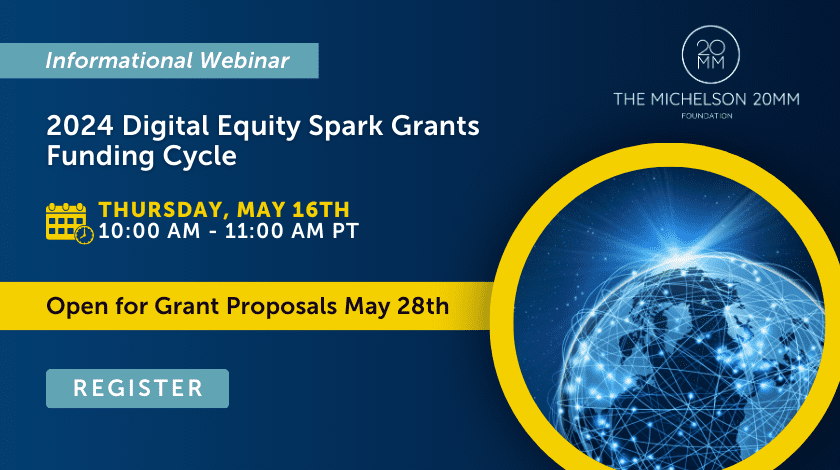
- This event has passed.
2024 Digital Equity Spark Grants Informational Webinar
May 16 @ 10:00 am - 11:00 am
Free
Thursday, May 16, 2024 | 10:00 a.m. – 11:00 a.m. PST
Register for the event
Access to digital technology and reliable Internet dictates whether or not we can access education, healthcare, search and apply for jobs, and even meaningfully engage in democracies. We strive to close the digital divide in all its forms, particularly among underserved and historically digitally redlined communities. Our vision is to create a future in which all individuals have the knowledge, tools, and means needed for full participation in our society, democracy, and economy.
The Michelson 20MM Foundation is committed to building awareness of and working to close the “digital divides” through paradigm-shifting policies and convenings of cross-sectoral leaders to increase investments into innovative solutions.
This year, Michelson 20MM will continue making investments through the Michelson Spark Grants program to help surface and scale additional solutions to these critical issues.
The 2024 Digital Spark Grants funding cycle opens on May 28th and closes on June 11th.
This Digital Equity Spark Grants funding cycle seeks to fund projects that support systems-level strategies, with potential to create positive impact at scale, and inform public policy.
Focus Areas
- Eliminating Digital Discrimination: Efforts that help address the impact that low-quality and/or unaffordable Internet has in areas that may superficially appear to have Internet access, and provide tools to combat digital discrimination and to promote equitable access to broadband throughout California. By focusing on the role of race in the historical causes of digital equity, we seek to grow awareness and uplift the voices and needs of underserved communities that have been deliberately excluded from connectivity by systematic redlining and disinvestment. These may include but are not limited to: 1) Efforts that highlight disparities in broadband access; 2) Research that addresses mapping shortcomings at the state level; and/or 3) Storytelling, surveying, testimonial-gathering.
- Policy Advocacy and Civic Engagement: Efforts that increase civic participation in digital equity policy-making and regulatory processes at the local, regional, or state-level (including the education of state policy-makers on key digital equity issues). This may include efforts focusing on education, capacity-building, and the equitable implementation of digital equity policy.
- Digital Equity and Artificial Intelligence (AI): Projects that aim to ensure communities that have been historically underinvested have access to and are prepared to take advantage of technological advancements in AI for full participation in our society, as well as projects that are aimed at increasing transparency and equity in the use and development of AI tools.
- Digital Equity as a Social Determinant of Health: Efforts that address digital inequity through its impact as a social determinant of health, and that can be a promising practice to be scaled across the state. Efforts that bridge the digital divide in at least one of the following issue areas: 1) Higher Education (i.e.: Research on the impact of digital inequity on college students); 2) Healthcare/Public Health (i.e.: Equitable access to digital healthcare); 3) Economic Opportunity (i.e.: Workforce Development; equitable access to seeking, applying, and securing jobs); and/or 4) Civic Engagement (i.e.: Access to public benefits).
- Digital Equity in Tribal Communities: Projects that help Tribal communities bridge the digital divide and achieve digital sovereignty. This may include but isn’t limited to: 1) Digital Equity Research & Education (i.e.: Research on the impact of digital inequity on Tribal communities, digital equity best practices, and more); 2) Community Capacity-building; and/or 3) Broadband Infrastructure Workforce Development.
Funding Cycle Details
Given the size and scope of digital inequity and the complexity of securing adequate funding for programs and initiatives to fully address the issue, we welcome proposals where Michelson Spark Grant funds are part of a larger overall project with multiple funding streams.
We will not be funding initiatives that provide direct assistance to students during this Michelson Spark Grant round (e.g. laptops or hotspots for remote learning). While we realize there is a tremendous need in our communities for this type of direct support, we are leveraging our funding to effect broader systemic change at this time.
For this funding cycle, we will focus on organizations that are doing work in California.
Join Us to Learn More
Digital Equity Senior Program Manager Cristal Mojica and Director of Operations and Programs Ryan Erickson-Kulas will host an informational webinar on Thursday, May 16th, at 10:00 am PT. They will provide an in-depth overview of the Spark Grants program, highlight past awardees, and answer any questions from attendees.